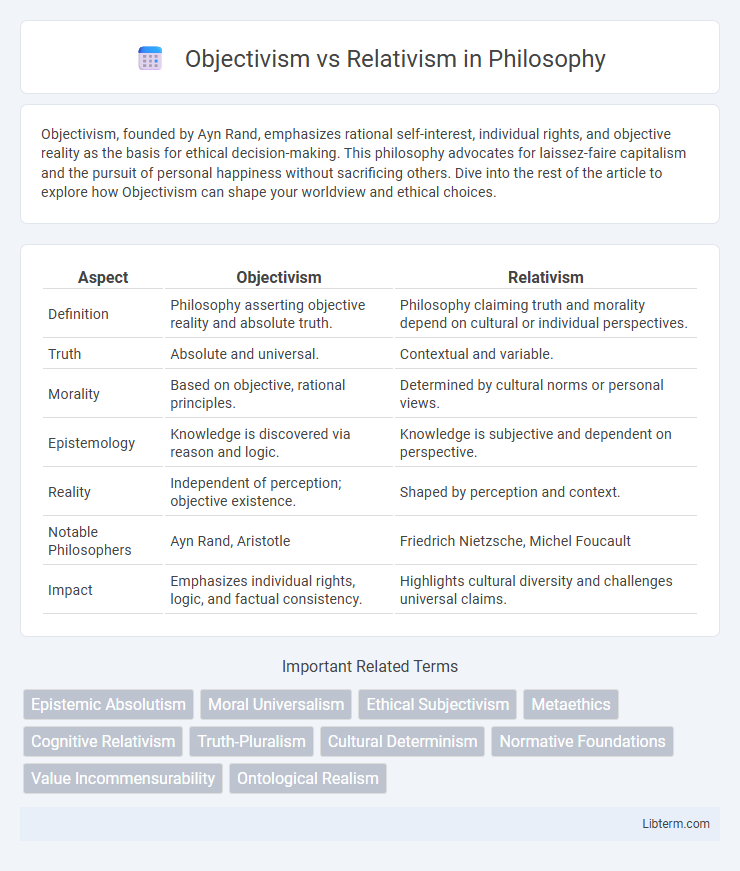Objectivism, founded by Ayn Rand, emphasizes rational self-interest, individual rights, and objective reality as the basis for ethical decision-making. This philosophy advocates for laissez-faire capitalism and the pursuit of personal happiness without sacrificing others. Dive into the rest of the article to explore how Objectivism can shape your worldview and ethical choices.
Table of Comparison
| Aspect | Objectivism | Relativism |
|---|---|---|
| Definition | Philosophy asserting objective reality and absolute truth. | Philosophy claiming truth and morality depend on cultural or individual perspectives. |
| Truth | Absolute and universal. | Contextual and variable. |
| Morality | Based on objective, rational principles. | Determined by cultural norms or personal views. |
| Epistemology | Knowledge is discovered via reason and logic. | Knowledge is subjective and dependent on perspective. |
| Reality | Independent of perception; objective existence. | Shaped by perception and context. |
| Notable Philosophers | Ayn Rand, Aristotle | Friedrich Nietzsche, Michel Foucault |
| Impact | Emphasizes individual rights, logic, and factual consistency. | Highlights cultural diversity and challenges universal claims. |
Introduction to Objectivism and Relativism
Objectivism asserts that reality exists independently of consciousness and that facts are objective, universal, and discoverable through reason, emphasizing moral absolutes and fixed truths. Relativism challenges this by arguing that truth and morality are context-dependent, varying with culture, society, or individual perspectives, thus rejecting universal standards. The debate between Objectivism and Relativism centers on whether ethical values and truths are absolute or contingent upon human experience.
Defining Objectivism: Core Principles
Objectivism asserts that reality exists independently of consciousness and that individuals can gain objective knowledge through reason. Its core principles include the law of identity, emphasizing that things are what they are, and ethical egoism, which promotes rational self-interest as the moral purpose of life. Objectivism rejects relativism by affirming absolute truths and objective morality grounded in reality.
Understanding Relativism: Key Concepts
Relativism asserts that truth and moral values are not absolute but vary depending on cultural, social, or individual perspectives, emphasizing contextual understanding. Key concepts include cultural relativism, which highlights that ethical norms differ across societies, and epistemic relativism, which argues that knowledge is influenced by varying frameworks and experiences. This approach challenges universal claims, promoting tolerance and empathy by recognizing diverse worldviews and interpretations.
Historical Origins and Influences
Objectivism, rooted in the philosophy of Ayn Rand during the 20th century, emphasizes absolute truths and objective reality, drawing influence from Aristotle's commitment to logic and reason. In contrast, Relativism traces back to ancient sophists and gained momentum through postmodern thinkers like Friedrich Nietzsche, who challenged universal truths by emphasizing cultural and subjective contexts. The historical origins of these philosophies reveal a fundamental divide between belief in fixed principles versus adaptable interpretations shaped by societal influences.
Objectivism in Ethics and Morality
Objectivism in ethics asserts that moral truths exist independently of human beliefs or feelings, grounded in objective reality and reason. It emphasizes universal moral principles derived from rational self-interest and the nature of human beings as rational entities. This standpoint rejects moral relativism's claim that ethical values are subjective or culturally dependent, advocating for consistent, universally applicable standards of right and wrong.
Relativism in Ethics and Morality
Relativism in ethics asserts that moral principles are not universal but depend on cultural, social, or individual perspectives, rejecting the notion of absolute moral truths. This perspective emphasizes that ethical values vary across societies and historical contexts, making morality fluid and context-dependent. Critics argue that relativism challenges the possibility of objective moral judgments, potentially leading to moral ambiguity or tolerance of harmful practices.
Objectivism vs. Relativism in Science
Objectivism in science asserts that scientific truths exist independently of human beliefs or cultural perspectives, emphasizing universal principles and objective facts. Relativism in science argues that scientific knowledge is shaped by social, cultural, and historical contexts, suggesting that facts may vary across different frameworks. The debate centers on whether scientific knowledge is absolute and universally valid or contingent and interpretative based on varying worldviews.
Social and Cultural Implications
Objectivism asserts universal truths and moral principles that transcend cultural boundaries, promoting stable social norms and objective justice systems. Relativism emphasizes the variability of values and ethics across societies, encouraging cultural tolerance but potentially leading to fragmented social cohesion and conflicting legal standards. The tension between these philosophies shapes debates on multiculturalism, human rights, and the legitimacy of cultural practices in globalized societies.
Major Criticisms and Debates
Objectivism is criticized for its rigid belief in absolute truths and moral values, often seen as dismissive of cultural diversity and contextual nuances. Relativism faces debates around its potential to justify moral ambiguity or ethical paralysis, undermining universal standards and accountability. Philosophical discourse centers on reconciling these approaches, balancing objective moral principles and the recognition of subjective, cultural differences.
Conclusion: Navigating Objectivism and Relativism
Navigating Objectivism and Relativism requires balancing the pursuit of universal truths with the acknowledgment of cultural and situational contexts that shape human understanding. Embracing a nuanced approach allows for ethical frameworks that respect objective principles while remaining adaptable to diverse perspectives. This synthesis fosters more effective dialogue and decision-making in complex moral and philosophical landscapes.
Objectivism Infographic

 libterm.com
libterm.com